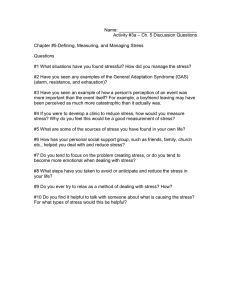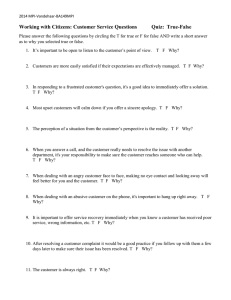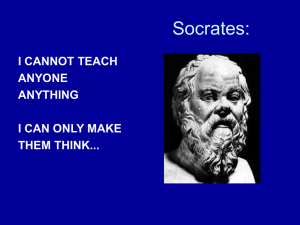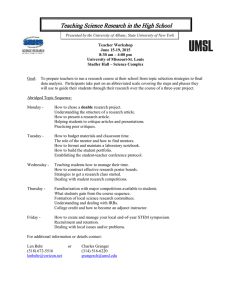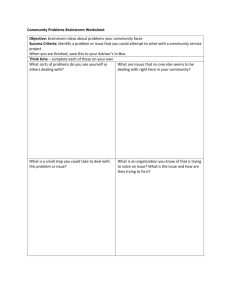Algorithms, Programs, and Computers CS 110 Fall 2005
advertisement
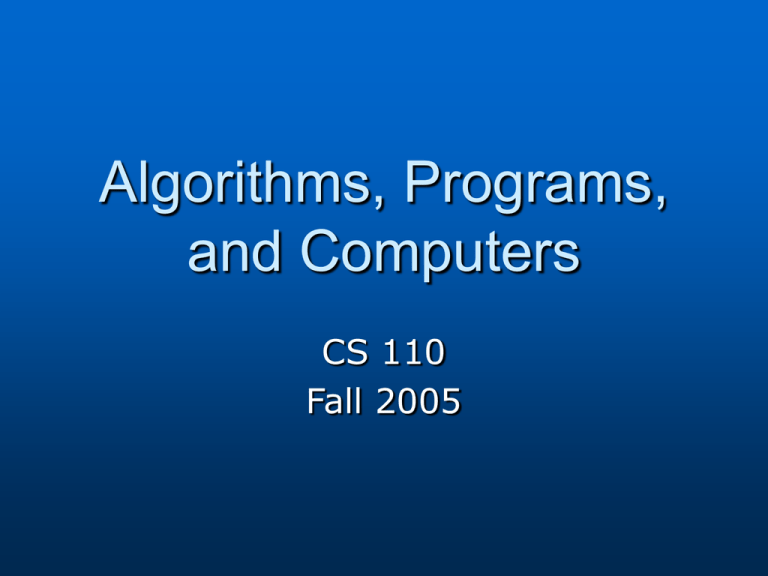
Algorithms, Programs,
and Computers
CS 110
Fall 2005
Problem Solving
You want to make money and you
have some simpletons who are
willing to help
• Devise a plan that will make money
(write a business plan for starting a
restaurant)
• Tell the simpletons to execute the
business plan
Problem Solving
The simpletons can make mistakes
• Refine the communication of
instructions to them
Use time cards, tables, flow charts, pictures
Develop a bullet proof “process”
Problem Solving
You want to make money and you
have a computer to help you
• Devise an algorithm (plan)
• Make the algorithm very detailed so a
simpleton can do it (program)
• Execute the program (computer)
Hardware / Software
A program is a sequence of
instructions that tell the computer
what to do
• What language do computers speak?
• What language do people speak?
Computer Language
Assembly Language
• ADD R1, R2
• MOV [R5], R1
• IF (R4 < R2) JMP A:
Very sequential
Like a flow chart
Not the language of human users
It Gets Worse
Computer logic is even more
primitive
• AND
• OR
• NOT
All programs (nearly every electronic
device you use) operates with only
these three logical operations
It Gets Much Better
Computer software exists to create
an abstraction between AND/OR/NOT
and human language/logic
Programming Languages
• C++, Java, C#, Perl
C++
void main (int argc, char **argv) {
printf (“Hello, world\n”);
}
Java
class program
{
public static void main(String args[]) {
System.out.println("Hello World!");
}
}
Why So Many Languages?
Each has strengths and weaknesses
• Error protection
Syntax in English vs. syntax in German
• Expressiveness
Eskimo words for snow
Multipurpose Computers
How can computers interpret so
many different languages?
• Translate them all into a common
language (machine language)
Compilers!
Recap: Problem Solving
Computers execute machine
language
Programs are a sequence of
instructions in some language
Compilers transform programs from
one language to another, usually a
simpler one
Algorithms
The way one solves a problem
• Divide and conquer
• Top-down or bottom-up
• Simplify
• Deduction
• Trial and error
Dealing Out Cards
Poker: deal five cards to everyone at
the table
How?
(step by step)
Draw a Square
Draw a Triangle
Recap: Algorithms
An approach to solving a problem
A sequence of steps
Break a complex problem into
simpler pieces
The first step in making computers
work for you!
Complexity
There’s a danger here
• Time is scarce
• Simple algorithms may entail inordinate
time and resources
• Computers are simpletons
We must think about an algorithm’s
complexity before using it
Complexity of Cards
Consider dealing five cards
• One second per deal
• How long to finish dealing five cards to:
2 players
Complexity of Cards
Consider dealing five cards
• One second per deal
• How long to finish dealing five cards to:
3 players
Complexity of Cards
Consider dealing five cards
• One second per deal
• How long to finish dealing five cards to:
4 players
Complexity of Cards
Consider dealing five cards
• One second per deal
• How long to finish dealing five cards to:
100 players
Complexity of Cards
It takes 5 * num_players time
time
Number of players
A Linear Time Algorithm
Complexity of Other Problems
Many problems are polynomial (n2)
• Execution time grows as the square of
the problem size (sorting names)
time
Problem size
Complexity of Other Problems
Many problems are exponential (2n)
• Execution time grows as to the nth with
increase in problem size (Traveling
Salesperson Problem)
time
Problem size
Complexity of Other Problems
Some problems are intractable
• There are 1079 atoms in Universe
• It would be impossible to solve an
algorithm this complex
Complexity of Other Problems
Some problems are not computable
• Literally no end to computation to be
donw
Recap: Algorithms
Algorithms have different
complexities
Complexity is important to
understand
• What is knowable?
• How difficult is it to acquire?
